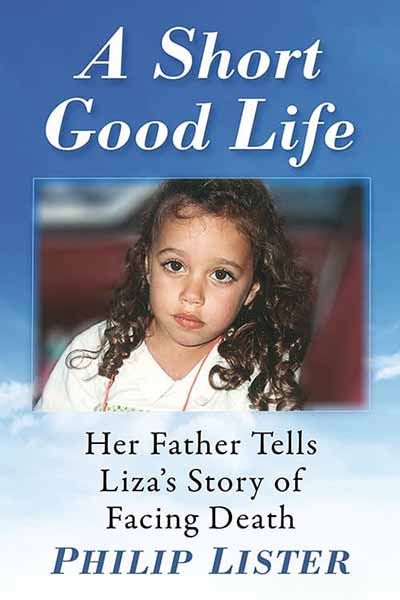A Short Good Life
Her Father Tells Liza's Story of Facing Death
by Philip Lister
It's unusual to access a child's mind during the magic years of childhood. It's rarer when the child is facing her death. Liza, an ardent child with a deep love of cows and the color purple was diagnosed with leukemia at age four and died two years later in 1996. Liza was an unusually expressive child and her parents, both child psychiatrists, were uniquely oriented to appreciate the richness of a child's mind. Through writing this book, Liza's father strove to reveal the inner world of a child's mind--and a parent's mind--as few other books can. At its center, this is the story of a child's psyche growing and striving to understand all she could of her experience, and of a small family coping with life's biggest challenges. It is a story of love's power to help a family cope and endure despite loss, and to grow, through darkness, back toward a full embrace of life. Through the process, the family emerges transformed, awed by the capacities of this child
Purchase options
In the News
> INTERVIEW: TWO PSYCHIATRISTS FACE THE ILLNESS OF THEIR DAUGHTER
In an interview with Harvey Schwartz, MD, Phil Lister shares the tragedy of the loss of his daughter, the process of writing A Short Good Life, and his evolution as a therapist.
> INTERVIEW: WITH ASSOCIATION FOR PSYCHOANALYTIC MEDICINE AT COLUMBIA
A moving conversation about content and process of A Short Good Life with Lisa Gornick and Philip Lister.
> PODCAST INTERVIEW: ABOUT EDUCATION (audio)
An eclectic podcast from CSUCI - Californa State University Channel Islands. An interview with Phil about his book.
> PODCAST INTERVIEW: LET'S TALK DEATH (audio)
A podcast from HealGrief.org. Hosts Fran Solomon and Andy McNiel MA discuss aspects of Phil's experience with grief.
> PODCAST INTERVIEW: GIVE GRIEF A CHANCE (audio)
Diane Morgan's podcast brings grief awareness into the open. Diane discusses A Short Good Life with Phil.
> PODCAST INTERVIEW: ASK THE AUTHOR - CANCER UNIVERSITY (video)
Andrea Wilson Woods of Cancer University discusses A Short Good Life with Phil.
> ARTICLE: BROWN UNIVERSITY CHILD AND ADOLESCENT BEHAVIOR LETTER
"Book sheds light on how to help child dying of cancer, by child psychiatrist dad." March 2022. Scroll to pages 6-7 of letter.
> BOOK REVIEW: KIRKUS REVIEW
The review concludes: "An emotionally honest, informative, and beautifully composed cancer account; a solid addition to the genre."
> AUTHOR PROFILE
A short profile in Duke University School of Medicine alumni news.

About the Author
Philip Lister was an adult and child psychiatrist and psychoanalyst in private practice in New York City. He worked with children, teens, adults, and couples. He also was trained in Somatic Experiencing and EMDR. He was affiliated with Weill Cornell, Columbia, and Mount Sinai medical centers and taught the art of psychotherapy with children and adolescents. In later years he worked as a therapist in the Phase 3 research study treating PTSD with MDMA-assisted psychotherapy.
Phil died on June 22, 2024.
For further information or inquiries: elenalistermd.com, [email protected]









